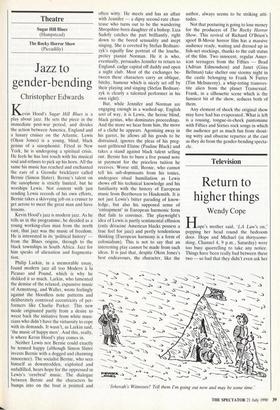Theatre
Sugar Hill Blues (Hampstead) The Rocky Horror Show (Piccadilly)
Jazz to gender-bending
Christopher Edwards
Kevin Hood's Sugar Hill Blues is a play about jazz. He sets the piece in the
immediate post-war period, and divides the action between America, England and a luxury cruiser on the Atlantic. Lewis (Okon Jones) is a young, blind, black genius of a saxophonist. Feted in New York, he is undergoing a spiritual crisis.
He feels he has lost touch with his musical soul and refuses to pick up his horn. All the same his music has reached and enchanted the ears of a Geordie bricklayer called Bernie (Simon Slater). Bernie's talent on the saxophone is strictly limited, but he worships Lewis. Not content with just sending Lewis records of his own efforts, Bernie takes a skivvying job on a cruiser to get across to meet the great man and have lessons.
Kevin Hood's jazz is modern jazz. As he tells us in the programme, he decided as a young working-class man from the north east, that jazz was the music of freedom. He is interested in its 'political history' from the Blues origins, through to the black townships in South Africa. Jazz for him speaks of alienation and fragmenta- tion.
Philip Larkin, in a memorable essay, found modern jazz all too Modern a la Picasso and Pound, which is why he disliked it so much. Larkin, who lamented the demise of the relaxed, expansive music of Armstrong, and Waller, wrote feelingly against the bloodless note patterns and deliberately contrived eccentricity of per- formers like Charlie Parker. This new mode originated partly from a desire to wrest back the initiative from white musi- cians who didn't have the virtuosity to cope with its demands. It wasn't, as Larkin said, 'the music of happy men'. And this, really, is where Kevin Hood's play comes in.
Neither Lewis nor Bernie could exactly be termed happy (although Simon Slater invests Bernie with a dogged and charming innocence). The socialist Bernie, who sees himself as downtrodden, exploited and unfulfilled, hears hope for the oppressed in Lewis's 'cerebral' music. The dialogue between Bernie and the characters he bumps into on the boat is pointed and
often witty. He meets and has an affair with Jennifer — a dipsy second-rate chan- teuse who turns out to be the wandering Shropshire-born daughter of a bishop. Liza Sadofy catches the part brilliantly, right down to the bored sensuality and inept singing. She is coveted by Stefan Bednarc- zyk's equally fine portrait of the louche, proley pianist Norman. He it is who, eventually, persuades Jennifer to return to England, cadge capital off daddy and open a night club. Most of the exchanges be- tween these characters carry an oblique, bitchy, humour which is nicely set off by their playing and singing (Stefan Bednarc- zyk is clearly a talented performer in his own right).
But, while Jennifer and Norman are engaging enough in a washed-up, English sort of way, it is Lewis, the heroic blind, black genius, who dominates proceedings. And the more we hear from him, the more of a cliché he appears. Agonising away in his garret, he allows all his goods to be distrained, ignores the pleas of his preg- nant girlfriend Elaine (Pauline Black) and takes a stand against black talent selling out. Bernie has to burn a five pound note in payment for the priceless tuition he receives. Worse still, Bernie, who cannot tell his sub-dominants from his tonics, undergoes ritual humiliation as Lewis shows off his technical knowledge and his familiarity with the history of European music from Beethoven to Hindemith. It is not just Lewis's bitter parading of know- ledge, but also his supposed sense of 'entrapment' in European harmonic form that fails to convince. The playwright's idea of Lewis is partly sentimental effusion (only deracine American blacks possess a true feel for jazz) and pertly tendentious thinking (European harmony is a form of colonialism). This is not to say that an interesting play cannot be made from such ideas. It is just that, despite Okon Jones's best endeavours, the character, like the author, always seems to be striking atti- tudes.
Not that posturing is going to lose money for the producers of The Rocky Horror Show. This revival of Richard O'Brien's spoof B-Movie horror film has a massive audience ready, waiting and dressed up in fish-net stockings, thanks to the cult status of the film. Two innocent, regular Amer- ican teenagers from the Fifties — Brad (Adrian Edmondson) and Janet (Gina Bellman) take shelter one stormy night in the castle belonging to Frank N Furter (Tim Mclnnerny), a whip-toting transves- tite alien from the planet Transexual. Frank, in a silhouette scene which is the funniest bit of the show, seduces both of them.
Any element of shock the original show may have had has evaporated.. What is left is a rousing, tongue-in-cheek pantomime with Fifties and Sixties rock songs in which the audience get as much fun from shout- ing witty and obscene repartee at the cast as they do from the gender-bending specta- cle.


















































 Previous page
Previous page